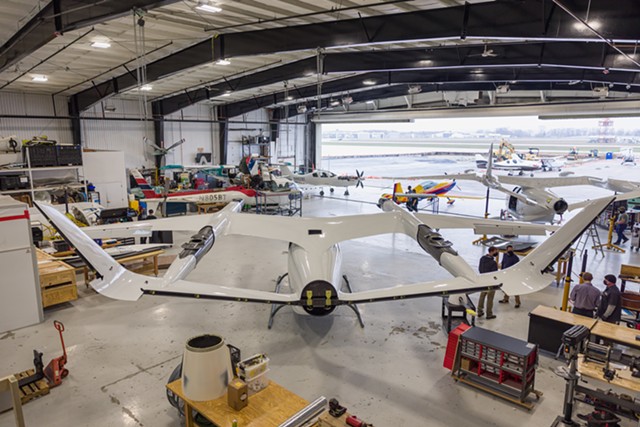
- Oliver Parini ©️ Seven Days
- The Beta facility at BTV
Updated at 4 p.m.
Electric aviation startup Beta Technologies plans to build a 270,000-square-foot manufacturing plant at the Burlington International Airport that will employ up to 500 people, the company said Tuesday.
Beta, which is headquartered in a hangar near the main terminal, announced the expansion plan at the same time the company closed a $368 million fundraising round that attracted investment from
Amazon's Climate Pledge Fund, among others.
Proceeds will bankroll the new assembly facility for its Alia electric aircraft, according to a Beta press release. The company hopes to break ground this fall.
The total amount of new funding exceeded the $333 million Beta had sought to raise, according to SEC disclosures first reported by
Seven Days last week in a
cover story on the company. Beta founder and CEO Kyle Clark told
Seven Days in an interview for that story that he hoped to continue expanding the startup, which has tripled in size over the last year to more than 230 employees, in his home state of Vermont.
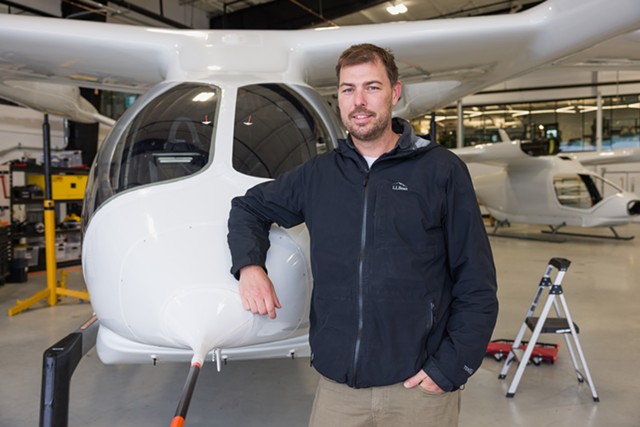
- Oliver Parini ©️ Seven Days
- Beta founder and CEO Kyle Clark
In a press call on Tuesday, Clark said his company decided to locate the initial production facility in Vermont for reasons that were "nonfinancial," including easier coordination between Beta's development and production departments.
"We have 200-plus folks here that have studied and built and flown these aircraft," Clark said. "They need to be involved in the initial production to ensure that it goes smoothly."
Clark further said that the company's sustainability mission resonates with Vermont culture, and, accordingly, Beta's growing workforce. The plant will be built in ways that minimize environmental impact, and it will be large enough to produce between 250 and 400 aircraft annually, Clark said.
Beta is eying two parcels on airport property, airport director of aviation Gene Richards said. The larger of them is east of Valley Road at the end of the airport runway, known as the "South 40." A sand pit occupies part of the land, and an RV dealer leases another portion to park its trailers. The second location is near the end of Eagle Drive, just northwest of the Vermont Flight Academy.
The company would lease the land from the airport, which requires approval by the Burlington City Council and Mayor Miro Weinberger. New structures would separately require permits from the City of South Burlington and the State of Vermont.
Beta has submitted a sketch plan review application to South Burlington's Development Review Board, the company said.
Beta's announcement includes supportive statements from Gov. Phil Scott, Sen. Patrick Leahy (D-Vt.), Sen. Bernie Sanders (I-Vt.), Rep. Peter Welch (D-Vt.), Weinberger, South Burlington city manager Kevin Dorn, and others.
“I want to thank the community members and local, state and federal officials who have been overwhelmingly supportive since our start a few years ago,” Clark said in the release. “We look forward to growing together right here at home in Vermont as we enter this next phase."
The funding round was led by Fidelity, which valued Beta at $1.4 billion,
CNBC reported Tuesday morning. Amazon jumped in through its $2 billion investment fund, created to support the development of technologies that will help Amazon meet its sustainability goals. Clark told CNBC that he hoped Amazon would one day use Beta's electric aircraft as part of its Prime delivery network.
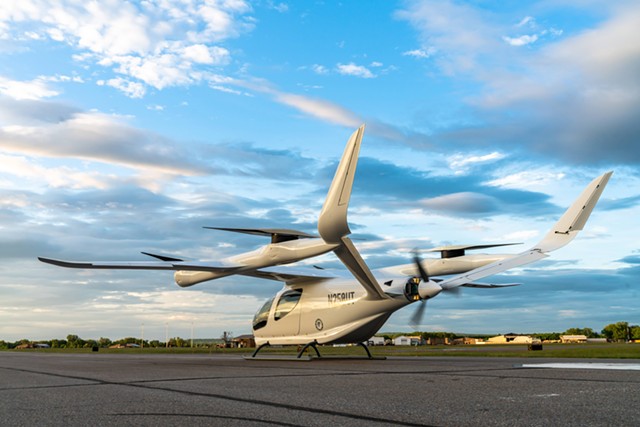
- Courtesy of Beta Technologies
- An Alia prototype
Numerous companies are racing to develop electric aircraft that can lift straight off the ground like a helicopter but don't burn fossil fuels. Several of Beta's competitors went public earlier this year, raising billions of dollars in the process.
While many developers are focusing on an aspirational market for urban air taxis, Beta has found interest in cargo-carrying customers, such as UPS, United Therapeutics and perhaps eventually Amazon.
"We would love it if we were able to prove to Amazon ... that we have the right technology for their challenges," Clark said. "We have some small indications that is the case, but we have a lot of flight testing and operational flight testing to show that that is the case."
Beta, founded in 2017, is hoping to get its first planes certified by the Federal Aviation Administration and delivered to customers by 2024. Clark said the latest investments, coupled with purchase orders from customers, should be enough to bring Beta to civil certification, as long as the company continues to hit flight testing and other development milestones.
Read more about Beta's origins and business strategy in
this week's cover story.










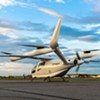

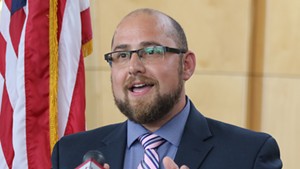

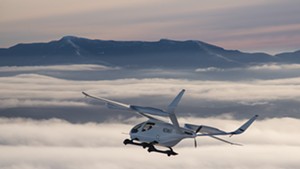





Comments
Comments are closed.
From 2014-2020, Seven Days allowed readers to comment on all stories posted on our website. While we've appreciated the suggestions and insights, right now Seven Days is prioritizing our core mission — producing high-quality, responsible local journalism — over moderating online debates between readers.
To criticize, correct or praise our reporting, please send us a letter to the editor or send us a tip. We’ll check it out and report the results.
Online comments may return when we have better tech tools for managing them. Thanks for reading.